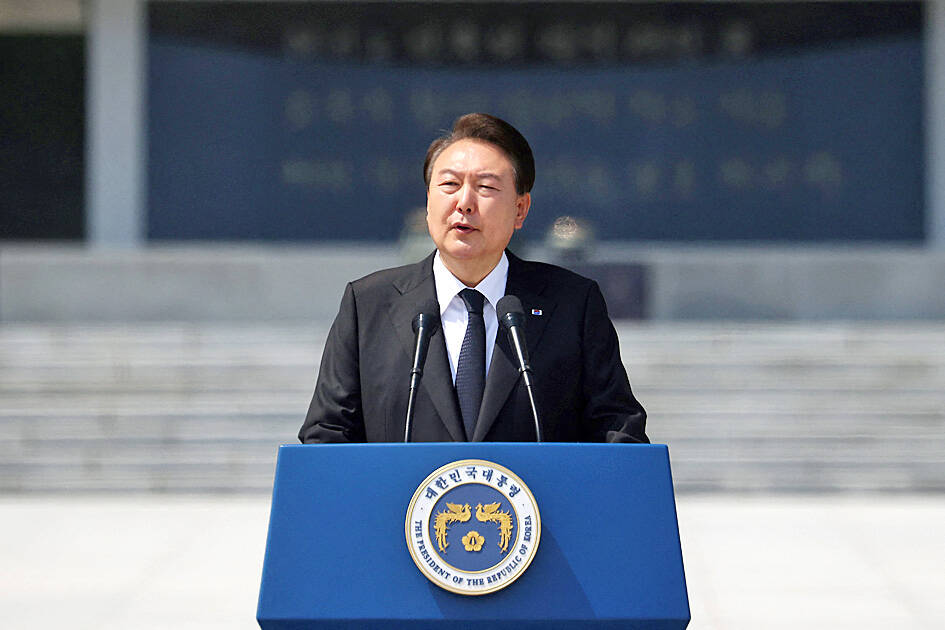South Korean President Yoon Suk-yeol yesterday said that he has upgraded the country’s alliance with the US to one that is “nuclear-based” in the face of North Korea’s growing military threat.
Yoon was referring to his talks with US. President Joe Biden in April on Washington’s willingness to give Seoul more insight into its nuclear planning in the event of potential conflict with nuclear-armed North Korea.
“North Korea is enhancing its nuclear and missile capabilities, and has legislated the use of nuclear weapons,” Yoon said in a speech marking South Korea’s Memorial Day.

Photo: AFP
At their summit in Washington, the two leaders agreed to strengthen the so-called US extended deterrence, which envisions the use of US nuclear weapons to defend South Korea.
“The South Korea-US alliance has now been elevated to ‘nuclear-based’ alliance,” Yoon said.
North Korea this year test-fired its biggest intercontinental ballistic missile, and last week attempted to launch its first spy satellite, although the rocket and the payload plunged into the sea.
North Korea made a rare and swift admission of the launch’s failure, but vowed to try again and put a satellite in orbit to increase its military surveillance capabilities.
The launch was widely condemned as violating UN Security Council resolutions that ban the use of ballistic missile technology by the North.
Pyongyang has rejected the ban as an infringement of its sovereign right to self-defense and space development.
While Yoon characterized his talks with Biden as an agreement to use US nuclear weapons in the event of a North Korean nuclear attack, Biden reiterated a pledge “to make every effort to consult” with allies on the use of a nuclear weapon.
Yoon did not elaborate further on the subject and devoted most of his Memorial Day speech to honoring those who had made sacrifices in defense of the country.

‘UNUSUAL EVENT’: The Australian defense minister said that the Chinese navy task group was entitled to be where it was, but Australia would be watching it closely The Australian and New Zealand militaries were monitoring three Chinese warships moving unusually far south along Australia’s east coast on an unknown mission, officials said yesterday. The Australian government a week ago said that the warships had traveled through Southeast Asia and the Coral Sea, and were approaching northeast Australia. Australian Minister for Defence Richard Marles yesterday said that the Chinese ships — the Hengyang naval frigate, the Zunyi cruiser and the Weishanhu replenishment vessel — were “off the east coast of Australia.” Defense officials did not respond to a request for comment on a Financial Times report that the task group from

DEFENSE UPHEAVAL: Trump was also to remove the first woman to lead a military service, as well as the judge advocates general for the army, navy and air force US President Donald Trump on Friday fired the chairman of the Joint Chiefs of Staff, Air Force General C.Q. Brown, and pushed out five other admirals and generals in an unprecedented shake-up of US military leadership. Trump wrote in a post on Truth Social that he would nominate former lieutenant general Dan “Razin” Caine to succeed Brown, breaking with tradition by pulling someone out of retirement for the first time to become the top military officer. The president would also replace the head of the US Navy, a position held by Admiral Lisa Franchetti, the first woman to lead a military service,

Four decades after they were forced apart, US-raised Adamary Garcia and her birth mother on Saturday fell into each other’s arms at the airport in Santiago, Chile. Without speaking, they embraced tearfully: A rare reunification for one the thousands of Chileans taken from their mothers as babies and given up for adoption abroad. “The worst is over,” Edita Bizama, 64, said as she beheld her daughter for the first time since her birth 41 years ago. Garcia had flown to Santiago with four other women born in Chile and adopted in the US. Reports have estimated there were 20,000 such cases from 1950 to

CONFIDENT ON DEAL: ‘Ukraine wants a seat at the table, but wouldn’t the people of Ukraine have a say? It’s been a long time since an election, the US president said US President Donald Trump on Tuesday criticized Ukrainian President Volodymyr Zelenskiy and added that he was more confident of a deal to end the war after US-Russia talks. Trump increased pressure on Zelenskiy to hold elections and chided him for complaining about being frozen out of talks in Saudi Arabia. The US president also suggested that he could meet Russian President Vladimir Putin before the end of the month as Washington overhauls its stance toward Russia. “I’m very disappointed, I hear that they’re upset about not having a seat,” Trump told reporters at his Mar-a-Lago resort in Florida when asked about the Ukrainian